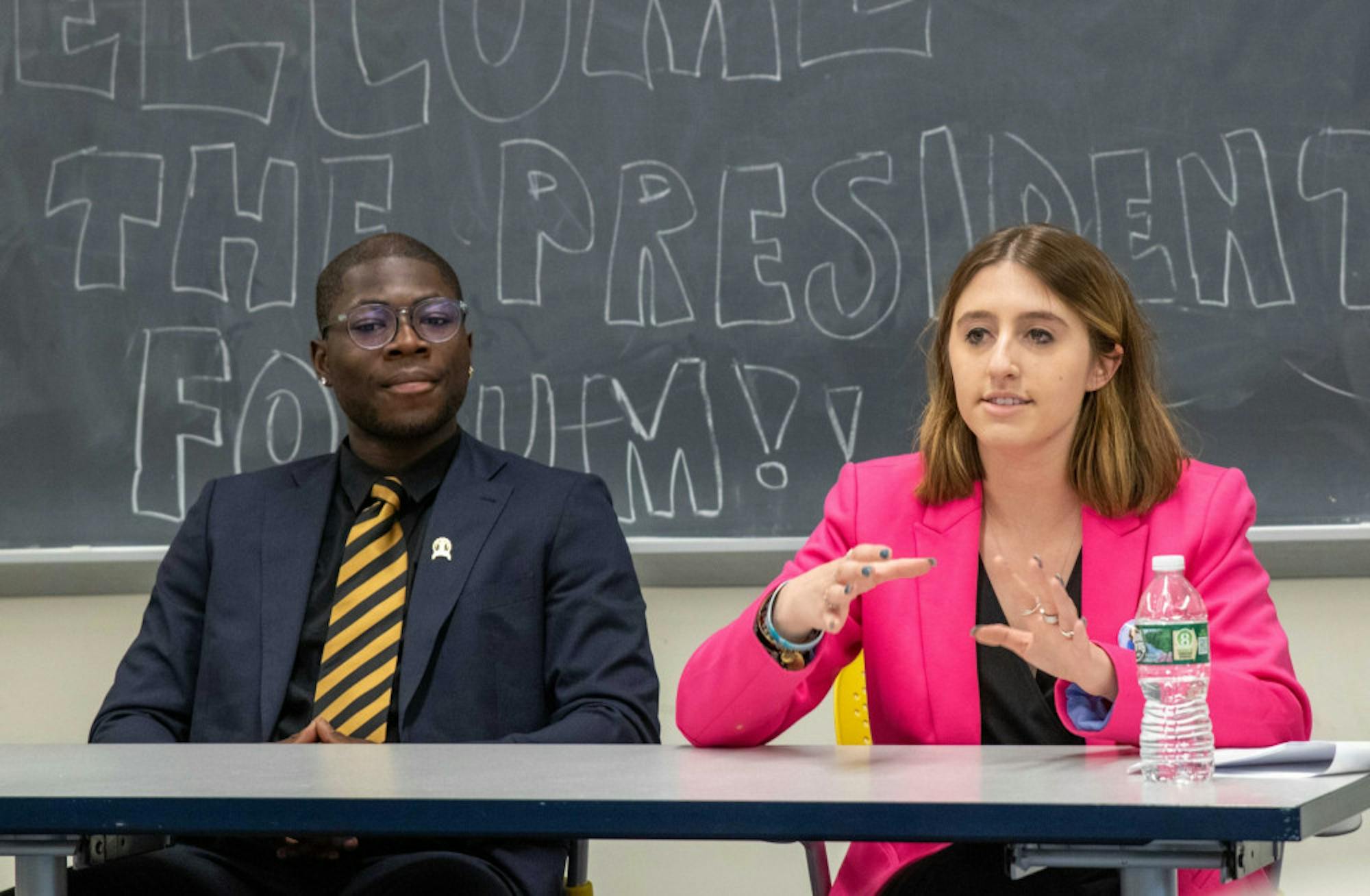Tufts Community Union Senate presidential candidates Arielle Galinsky and Wanci Nanaparticipated in a forum hosted by the TCU Elections Commission on April 25. During the forum, Galinsky and Nana, both juniors, fielded questions from ECOM and attendees of the forum.
In her opening statement, Galinsky, the current TCU Senate vice president, talked about her experience and her goals if elected.
“As a senator, I’ve been able to work through a lot of obstacles that have faced senators in the past and collectively, with the support that I’ve received from the amazing senate body, worked towards change,” she said. “It’s my goal and my objective to actively work towards reducing barriers for students with the understanding that these barriers are not equitably distributed across the school.”
Nana’s opening statement focused on his experiences as a former TCU senator, president of the Tufts Black Men’s Group, an interfaith ambassador and a varsity soccer player, as well as an outline of his plans if elected.
“Through those different positions, I’ve had the opportunity to engage with the Tufts community,” Nana said. “My focus is more so on creating spaces for the different people on this campus to share conversations and talk about things that matter to them … and [seeing] if there are opportunities for potential overlap that can be used to create programming, initiatives and conversations that serve everybody.”
Candidates were then asked how they would promote diversity and culture classes offered at Tufts. Nana, answering first, offered conversation as a solution.
“It comes down to … speaking with students, hearing what they’re interested in and … working with the different cultural centers, administration and staff that work with culture and seeing what knowledge gaps are there in our curriculum,” he said.
Galinsky pointed to a “lack of diversity among all Tufts hires, in all Tufts classes.”
“Diversifying classes stems [from] and relies on a diversification of staff, and the lack of diverse staff and professors at Tufts is an issue across every single department — from engineering to humanities — and therefore it trickles down and affects every single student’s Tufts experience,” she said.
Galinsky also said she would work with student leaders to put pressure on the administration and ensure that “the professors in each of these departments at Tufts is reflective of the diversity of the student body.”
Galinsky and Nana were then asked how their personal experiences shaped their ability to advocate for marginalized students.
Galinsky pointed to her work as vice president, ranging from advocating for two new identity centers to her work organizing a February DEIJ town hall, to her pilot program to put free menstrual products in bathrooms around campus.
Nana explained that, as a Black man at a predominantly white institution, he had to learn whom to “build relationships with in order to succeed within this system.”
“I would like to take what I have learned, alongside things that people in my community and outside of my community have learned … and amplify that so that other people who are not in the same position as myself, or students like us at Tufts, can still move forward and make the most out of whatever situation it is that they’re in,” he said.
The final question from ECOM focused on the candidates’ experiences uplifting the campus community from outside the Senate.
Nana referred to his experience with BMG and his community advocacy.
“I’ve created spaces for conversations for the Black men on our campus to discuss things that are relevant for them,” he said. “Within interfaith ambassadors, I have worked in spaces to create programming that brings together people from different backgrounds, different cultures and different perspectives … so that we can work together to make this community inclusive for everybody.”
Galinsky pointed to her work as president of Tufts Best Buddies, curator of TEDxTufts and co-founder and leader of the Legacy Project at Tufts.
“I have experienced what it’s like to start a club at Tufts, and the amount of obstacles that students have had to face while doing that, and that is definitely translated into my platform,” Galinsky said. “It’s been such a privilege to get to work with so many incredible individuals across the Tufts University platform and hear from them as to what matters most.”
After fielding questions from attendees of the forum, both candidates gave closing remarks. Nana said his experience building relationships and engaging with the Tufts community would help him as president.
“If I were to win the presidency, [I would] be stepping into a great system and structure full of great people that are very ambitious, very driven and very passionate about the work that they do,” Nana said. “I would like to work alongside them while also bringing in other stakeholders to the table to help amplify the greater effect of [the] Senate on our campus.”
Galinsky said she would draw from her three years of experience and continue to pursue more projects if elected as president.
“Experience in this role is extraordinarily important; you, as the president, have to serve and be the guide for the rest of the senate body, to let them know how to pursue projects and to show them how to actually make change,” she said. “The amount of obstacles I faced over these past three years have been immense, but because I’ve been able to work through them over the past years, I know how to overcome them and how to advise other senators.”






